
Tiana Hape-Cramond
Associate Registered Nutritionist
Saturated and trans fats are known as ‘bad’ fats due to their effects on heart health by raising LDL cholesterol while decreasing HDL cholesterol. Yet, they are commonly consumed in the Western diet, especially by eating processed foods.
Eating a variety of foods is important for a balanced diet. This is why the recommendation for
- Saturated fat is to be less than 12%, and
- Trans fats (including artificial trans fats) to be less than 1%
of the daily energy intake.
In saying that something is bad for us in higher quantities is one thing. That is why in this article we will look closely into detailed research and studies on the health risks of consuming diets high in trans fats and saturated fats.
What are trans and saturated fats?
Trans fats are unsaturated fatty acids that contain at least one double bond. Trans fats can occur both naturally and artificially.
Natural trans fats are found in some animal products such as
- Butter
- Meat
- Dairy
Trans fats are formed mainly during the hydrogenation of edible oils to make solid fats such as margarine.
Naturally occurring trans fats are not harmful when consumed in moderation and may actually be beneficial to our health. However, artificial trans fats are created and added to foods to extend their shelf life.[1]
Artificial trans fats may be harmful to our health.
Saturated fats is a fatty acid that is saturated in hydrogen atoms. This saturation makes these oils solid at room temperature.[2]
Saturated fats are found in animal products such as
- Beef
- Pork
- Full-fat dairy products
- Eggs
- Tropical oils (e.g. coconut oil and palm oil).[3]
There are different types of saturated fats:
- Odd-chain saturated fats
- Even-chain saturated fats[4]
All foods containing fats have a different mix and ratio of fats. Even healthier foods such as nuts contain saturated fats although the amount is smaller. Saturated fats are known to lower the LDL cholesterol in the body and increase the HDL cholesterol.
What foods are high in trans fats?
Foods high in trans fats | Amount per 100 g |
Margarine | 1.4 g |
Cheddar cheese | 1.05 g |
Vegetable oil | 0.9 g |
Cookie | 0.78 g |
Mince pie | 0.51 g |
Doughnut | 0.41 g |
Cheese pizza | 0.2 g |
Vegetable shortening | 0.1 g |
French fries | 0.06 g |
Potato chips | 0.02 g |
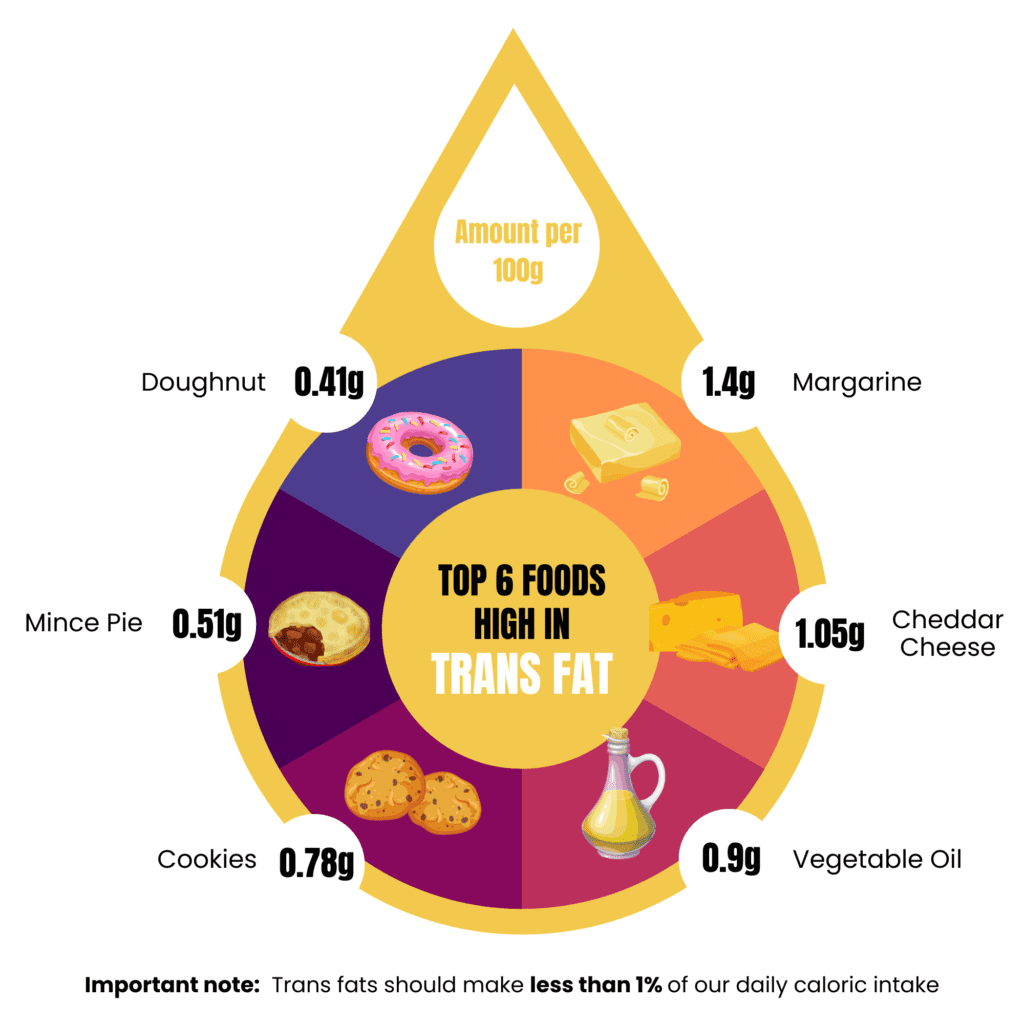
As we can see from the table and the illustration, trans fats can be found in some animal products as well as added into foods to make them last longer, such as processed snack foods.
What foods are high in saturated fats?
Foods high in saturated fats | Amount per 100 g |
Coconut oil | 83 g |
Butter | 53.9 g |
Cream | 30.7 g |
Coconut cream | 25.5 g |
(Tasty) cheese | 22.5 g |
Milk chocolate | 20 g |
Lamb chops | 11.8 g |
Beef meat pattie | 8.6 g |
Streaky bacon | 8.1 g |
Mixed meat sausage | 6.63 g |
Yogurt | 5.1 g |
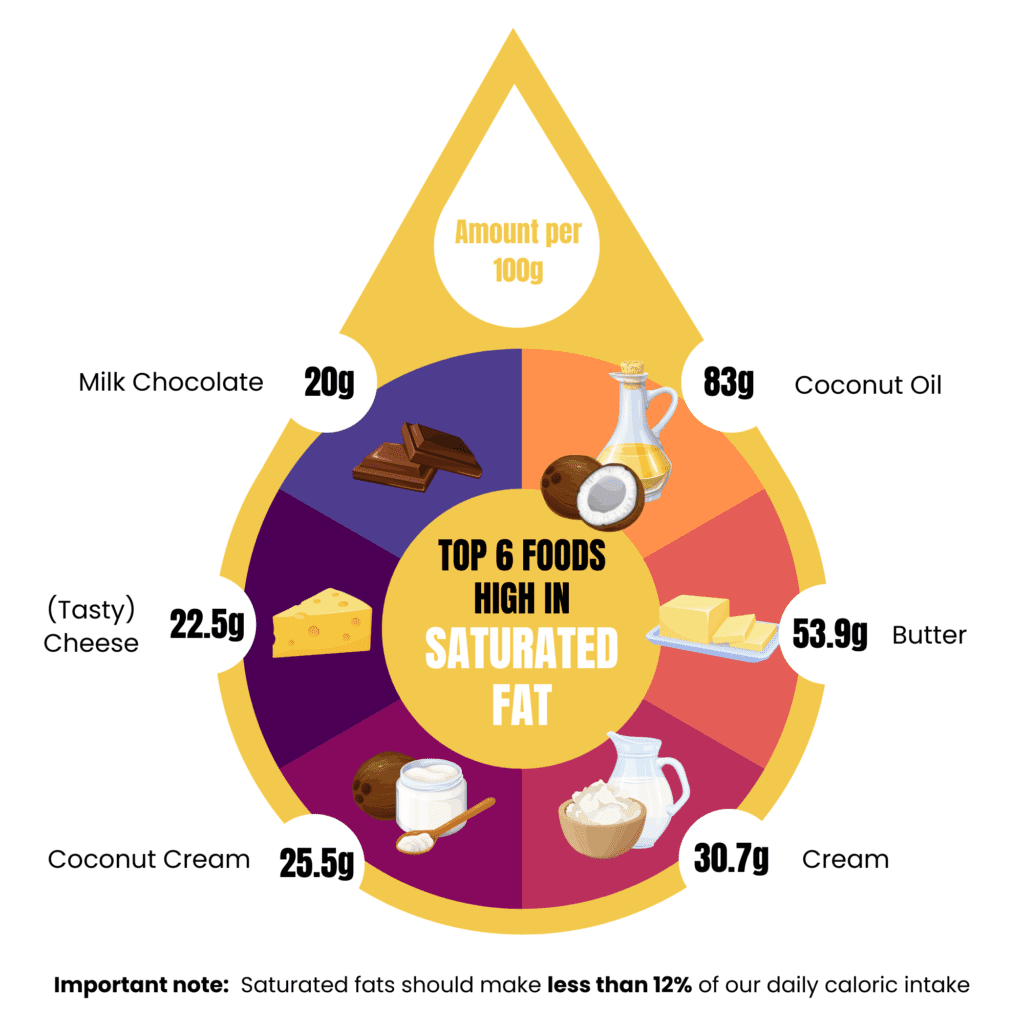
As we can see from the table and the illustration, saturated fats can be found in many foods but are mostly present in animal products.
Health risks of trans and saturated fats
When avoiding certain types of foods, it’s important to know why. Below are the health risks that trans and saturated fats may have on the body.
Cardiovascular disease development and trans and saturated fats
Although some studies have questioned the connection between saturated fats and heart disease, current evidence points to a relationship between the two.
Saturated fats are known to increase the LDL cholesterol, which increases the risk of heart disease. A review has found that reducing saturated fats decreased the risk of developing heart disease by 21%. A greater effect is seen when swapping saturated fats for polyunsaturated fats.[5]
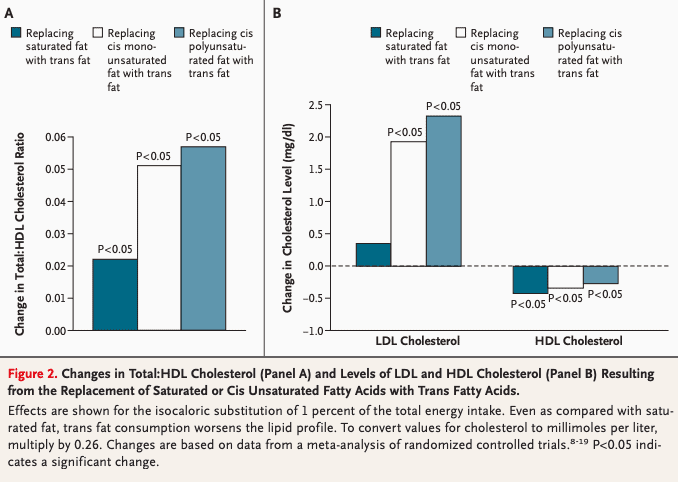
Source: Mozaffarian D, Katan MB, Ascherio A, Stampfer MJ, Willett WC.
Trans fats have also been seen to pose a risk to cardiovascular health. Trans fats can increase LDL cholesterol as well as increase other factors that influence cardiovascular health. These include
- Increase in inflammation
- Increased risk of diabetes
- Decreased health of the cells lining the arteries.[6,7]

Impact of trans and saturated fats on coronary heart disease
Saturated fat has been shown to have an effect on blood lipids. A study found that high intake of saturated fats was associated with an 18% increase in risk of coronary heart disease. This study also found that replacing 1% of saturated fat intake with polyunsaturated fat or wholegrain can decrease this risk by 6–8%.[8]
Heart disease is the primary risk posed by trans fats.
Trans fats raise LDL cholesterol levels and decrease HDL cholesterol levels, which is known to increase the risk of CHD.[9]

Diet high in trans and saturated fats, and an increase in stroke
Studies have found mixed results when looking at the relationship between trans fats and stroke. One study found that men who consumed a diet high in trans fats had a 14% increased risk of stroke, whereas in women these same results were not found.[10]
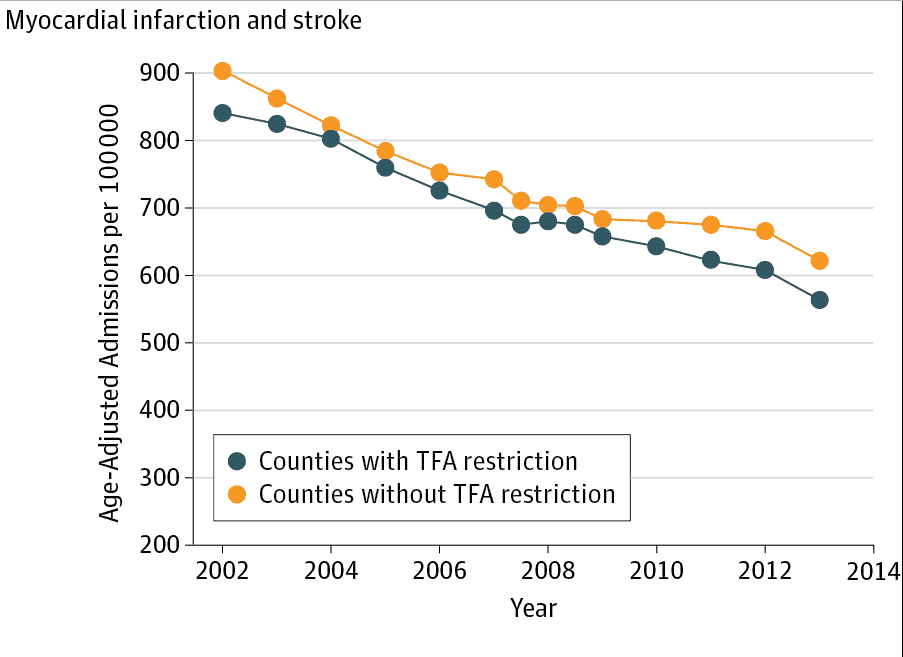
Source: Stephanie Hedt. Trans Fat Bans Linked to Reduction in Heart Attack and Stroke. (2017). USC Schaeffer
Another study investigated this relationship in women and found that women with a higher intake of trans fat had a 39% higher risk of having a stroke than women with a low intake of trans fat.[11]

Cholesterol levels and connection with trans and saturated fats
The effects of ‘bad fats’ and cholesterol have been well researched. A review on trans fats and cholesterol was conducted and found that fatty acids raise LDL cholesterol and lower HDL cholesterol.
This review suggested that removing trans fats from the diet may decrease the risk of cardiovascular disease by 1.5 to 6%.[12]
Consuming foods that are high in saturated fat and low in unsaturated fat can change the way that the liver breaks down cholesterol. It is suggested that eating too much saturated fat slows the LDL receptors in the liver, which can cause a build-up of LDL cholesterol.[13]

Cancer rates increase and connection with diets high in trans and saturated fats
During the past few decades, there have been studies that have demonstrated the link between saturated fat, meat consumption and increasing the risk for developing certain types of cancers.
A prospective study found that the increased intake of saturated fat and butter consumption was associated with an increased risk of developing pancreatic cancer.[14]
A case-control study concluded that a high intake of saturated fats may increase the prevalence of breast cancer in women.[15]
RELATED — How common is Breast Cancer and what are the Risk Factors?
Red meat has been shown to increase the risk of developing colorectal cancer. As red meat contains saturated fats, one of the studies concluded that a diet high in saturated fats increased the risk of developing colorectal cancer by 71% in the participants.[16]
A systematic review was conducted to investigate the relationship between trans fats and cancer, and the analysis of the data found a positive association between a high trans fat intake and prostate cancer and colorectal cancer.
RELATED — Prostate Cancer: All you need to know and are afraid to ask
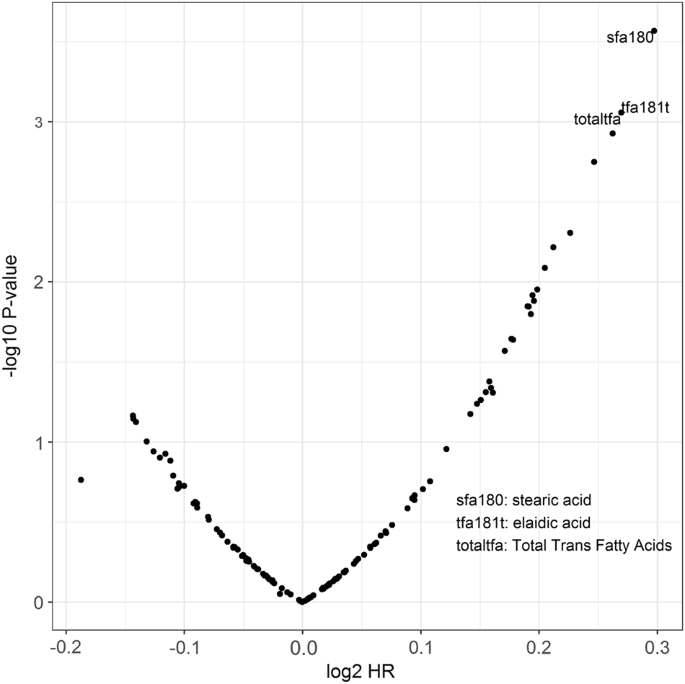
Source: Liss, M.A, Higher baseline dietary fat and fatty acid intake is associated with increased risk of incident prostate cancer in the SABOR study. (2018)
This review found that a diet high in trans fats can increase the risk of prostate cancer by 45% and the risk of developing colorectal cancer by 26%.[17]

Bone health and consumption of trans and saturated fats
Bone is a dynamic and complex structure. In roosters on a diet high in saturated fats, it was found that saturated fats may affect the absorption of dietary calcium, which consequently has an adverse effect on bone mineralisation.[18]
Using NHANES III data, a study was conducted to investigate the relationship between dietary fat and hip bone mineral density. This found that saturated fat had a negative effect on bone mineral density. These effects may be seen more in men.[19]

Weight gain, obesity and trans fat high diet
An eight-year study found a weak positive association between animal fat and weight gain.
Animal fats include trans and saturated fats.
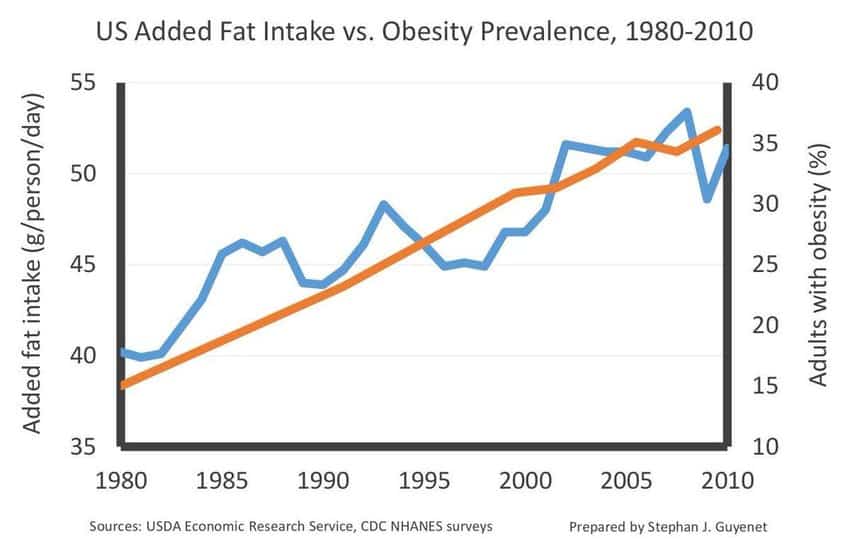
This study followed participants over eight years and found that diets high in trans and saturated fats resulted in more weight gain when compared to those who had a diet high in monounsaturated or polyunsaturated fats.[20]

Inflammation and link to trans and saturated fats
Saturated fats have been linked to tissue inflammation. Saturated fat intake can affect the stimulation of the postprandial as well as longer term inflammation by increasing proinflammatory genes.
A study concluded that saturated fats increase the inflammatory pathways even in healthy participants.[21]
Observational studies have looked at the relationship between trans fats and inflammation. One study observed that individuals with a high trans fat intake had an increase in systemic inflammation markers. Systemic inflammation may be linked to CHD and diabetes but more research is needed.[22]

Risk of diabetes while on a diet high in trans and saturated fats
There has been conflicting evidence of the relationship between saturated fat and diabetes. Even-chain saturated fats have been associated with an increased risk of developing type 2 diabetes, where
- Myristic acid increases the risk by 15%
- Palmitic acid increases the risk by 26%
- Stearic acid increases the risk by 6%
of developing type 2 diabetes.[4]
RELATED — Diabetes: Early Signs, Causes, Types and Treatment
Odd-chain saturated fats were associated with a lower risk of developing type 2 diabetes. It can be seen that
- Pentadecanoic acid decreases the risk by 21%
- Heptadecanoic acid decreases the risk by 33%.[4]
Diet high in trans fats has a higher risk of developing type 2 diabetes.
Reducing trans fat consumption to contribute less than 1% of the total energy may decrease the risk of developing diabetes by 40%.[23]

Alzheimer's disease
A diet high in saturated fats was found to increase the risk of Alzheimer’s disease by 39%.
A dose-response of a 4 g/day increment of saturated fat was found to be associated with an increased risk by 15% of developing Alzheimer’s disease.[24]
Another research also suggests that cardiovascular risk factors may increase the risk of developing Alzheimer’s or dementia. High intake of trans fats is seen to double the risk of developing Alzheimer’s disease.[25]

Brain health and diminished memory
Diets high in fats have been associated with declined cognitive performance.
A study performed on rats found that rats consuming high levels of saturated fats made greater errors in the maze. This study suggests that saturated fats and high cholesterol can impair memory and hippocampal morphology.[26]
RELATED — Diet and the Brain: Fats
The relationship between dietary trans fats and memory was tested using word recall on human participants. They found that a high intake of dietary trans fats was associated with a worse recall in adults during high productivity years (<45 years of age).[27]

Mental health and major depressive disorders
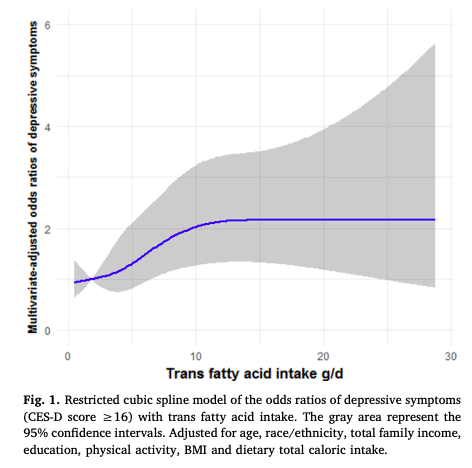
Diets high in saturated fats have been found to induce brain inflammation, which has been associated with depression-like behaviors in rodents. These results suggest that a high saturated fat intake causes dips in behaviors.[28]
Another study looked at the association between trans fats and depressive symptoms and found that high trans fat intake is associated with an increase in depressive symptoms in premenopausal women. These depressive symptoms were not affected by antidepressants.[29]
Source: Li D, Tong Y, Li Y. Associations of dietary trans fatty acid intake with depressive symptoms in midlife women.

Infertility and association with foods high in trans and saturated fats
Trans fats are thought to have an effect on ovum quality and sperm morphology due to the change in lipid membrane. A review was conducted that found that trans fats may have an adverse effect on sperm concentration and quality in men and have an increased risk of ovary infertility.
Artificial trans fats may lead to infertility.
It concluded that consuming more than 1% of total energy from trans fats may lead to infertility in both genders.[30]

Acne and link to trans and saturated fats
Foods that are high in saturated fats have been associated with high insulin growth factors. This insulin growth factor stimulates the production of sex hormones, which increase the production of acne.[31]
Trans fats have been associated with increasing inflammation markers that are present in acne. A study found that participants consuming a ‘western diet’, which is high in refined carbohydrates and fat, had an increase in acne.[32]

Respiratory health
Chronic inflammation in the airways is a characteristic associated with asthma. Consuming a diet high in saturated fat has been seen to increase the inflammation of the airways which may lead to developing asthma in individuals.[33]

RELATED — Natural remedies: For our respiratory health (sinuses, throat and lungs)
To summarize, the most common health issues associated with high consumption of trans and saturated fats are:
- Cardiovascular health
- Brain health and possibility of a stroke
- Cancers
- Obesity
- Diabetes
Dietary guidelines on healthy and unhealthy fats
Healthy fats include polyunsaturated fatty acids (PUFA) and monounsaturated fatty acids (MUFA).
The dietary guidelines from the New Zealand Ministry of Health for healthy fats are 6–10% of energy from PUFAs and 10–20% of daily energy from MUFAs. The international recommendations are similar, with up to 10% of total energy coming from PUFAs and 12–25% of total energy from MUFAs.[34]
Unhealthy fats consist of saturated and trans fats. The Ministry of Health recommends less than 12% of total energy to come from saturated fats and less than 1% of total energy from trans fats. The international recommendation for saturated fats is less than 10% of total energy and less than 1% for trans fats.[34]
Related Questions
1. Are there any benefits to eating trans fats?
A study has found that vaccenic acid, which is a natural trans fat, could decrease risk factors for diabetes, heart disease and obesity. So natural trans fats found in animal products, like milk and meat, may be beneficial for our health.[35]
2. Are there any benefits to eating saturated fats?
Odd-chain and very long chain saturated fats can be seen having a protective effect on type 2 diabetes, which means the consumption of these types of saturated fats may decrease the risk of developing type 2 diabetes.[4]
Saturated fats may also decrease the risk of hemorrhagic and ischemic stroke.[36]
3. Coconut oil is high in saturated fat. Should I avoid it?
Coconut oil is roughly 80% saturated fat, yes. Based on current evidence, coconut oil is neither a healthy nor unhealthy food.
Coconut oil can be used as a substitute for other vegetable oils but is best consumed in small quantities. The choice to consume coconut oil should be made with consideration of saturated fat recommendations and overall dietary pattern.[37]
The best way to control our diet is to know which food we should consume and how often. This doesn’t mean that we shouldn’t spoil ourselves with rich foods occasionally. But if and when we do, we need to use that food and calories as fuel to power our exercise, instead storing it.
For more details on exercise, training and how to move and feel better, see Activities and Performance.
Tiana is an Associate Registered Nutritionist who has a passion for public health and education. Working towards a Master’s in Nutrition Practice with a Bachelor’s in Human Nutrition, Tiana has a personal interest in healthy heart nutrition and promoting positive lifestyle behaviours.
Tiana is a part of the Content Team that brings you the latest research at D’Connect.
References
(1) Dhaka V, Gulia N, Ahlawat KS, Khatkar BS. Trans fats—sources, health risks and alternative approach-A review. Journal of food science and technology. 2011 Oct;48(5):534-41.
(2) Kubala J. Is Saturated Fat Unhealthy? [Internet]. Healthline. Healthline Media; 2022 [cited 2022 Jun 20]. Available from: https://www.healthline.com/nutrition/saturated-fat#what-is-it
(3) Saturated Fat [Internet]. www.heart.org. 2021 [cited 2022 Jun 20]. Available from: https://www.heart.org/en/healthy-living/healthy-eating/eat-smart/fats/saturated-fats
(4) Mozaffarian D. Saturated fatty acids and type 2 diabetes: more evidence to re-invent dietary guidelines. The Lancet Diabetes & Endocrinology [Internet]. 2014 Oct [cited 2022 Jul 10];2(10):770–2. Available from: https://www.thelancet.com/journals/landia/article/PIIS2213-8587(14)70166-4/fulltext
(5) Hooper L, Martin N, Jimoh OF, Kirk C, Foster E, Abdelhamid AS. Reduction in saturated fat intake for cardiovascular disease. Cochrane database of systematic reviews. 2020(8).
(6) Mozaffarian D, Katan MB, Ascherio A, Stampfer MJ, Willett WC. Trans fatty acids and cardiovascular disease. New England Journal of Medicine. 2006 Apr 13;354(15):1601-13
(7) Mozzaffarian, D. Trans Fats and Cardiovascular Health: Dr. Mozaffarian’s Testimony [Internet]. The Nutrition Source. 2006 [cited 2022 Jul 9]. Available from: https://www.hsph.harvard.edu/nutritionsource/2006/10/30/trans-mozaffarian-testimony/#:~:text=Studies%20in%20humans%20demonstrate%20that,are%20essential%20to%20cardiovascular%20health.
(8) Zong G, Li Y, Wanders AJ, Alssema M, Zock PL, Willett WC, Hu FB, Sun Q. Intake of individual saturated fatty acids and risk of coronary heart disease in US men and women: two prospective longitudinal cohort studies. bmj. 2016 Nov 23;355.
(9) Ginter E, Simko V. New data on harmful effects of trans-fatty acids. Bratislavske lekarske listy. 2016 Jan 1;117(5):251-3.
(10) Kiage JN, Merrill PD, Judd SE, He K, Lipworth L, Cushman M, Howard VJ, Kabagambe EK. Intake of trans fat and incidence of stroke in the Reasons for Geographic And Racial Differences in Stroke (REGARDS) cohort. The American journal of clinical nutrition. 2014 May 1;99(5):1071-6.
(11) Yaemsiri S, Sen S, Tinker L, Rosamond W, Wassertheil‐Smoller S, He K. Trans fat, aspirin, and ischemic stroke in postmenopausal women. Annals of neurology. 2012 Nov;72(5):704-15.
(12) Brouwer IA, Wanders AJ, Katan MB. Effect of animal and industrial trans fatty acids on HDL and LDL cholesterol levels in humans–a quantitative review. Plos one. 2010 Mar 2;5(3):e9434.
(13) Saturated fats [Internet]. Heartuk.org.uk. 2022 [cited 2022 Jul 10]. Available from: https://www.heartuk.org.uk/low-cholesterol-foods/saturated-fat
(14) Stolzenberg-Solomon RZ, Pietinen P, Taylor PR, Virtamo J, Albanes D. Prospective study of diet and pancreatic cancer in male smokers. American journal of epidemiology. 2002 May 1;155(9):783-92.
(15) Do MH, Lee SS, Jung PJ, Lee MH. Intake of dietary fat and vitamin in relation to breast cancer risk in Korean women: a case-control study. Journal of Korean Medical Science. 2003 Aug 1;18(4):534-40.
(16) Kim J, Oh SW, Kim YS, Kwon H, Joh HK, Lee JE, Park D, Park JH, Ko AR, Kim YJ. Association between dietary fat intake and colorectal adenoma in Korean adults: A cross-sectional study. Medicine. 2017 Jan;96(1).
(17) Michels N, Specht IO, Heitmann BL, Chajès V, Huybrechts I. Dietary trans-fatty acid intake in relation to cancer risk: a systematic review and meta-analysis. Nutrition Reviews. 2021 Jul;79(7):758-76 [cited 2022 Jul 10]. Available from: https://academic.oup.com/nutritionreviews/article/79/7/758/5954179
(18) Wohl GR, Loehrke L, Watkins BA, Zernicke RF. Effects of high-fat diet on mature bone mineral content, structure, and mechanical properties. Calcified tissue international. 1998 Jul;63(1):74-9.
(19) Corwin RL, Hartman TJ, Maczuga SA, Graubard BI. Dietary saturated fat intake is inversely associated with bone density in humans: analysis of NHANES III. The Journal of nutrition. 2006 Jan 1;136(1):159-65.
(20) Field AE, Willett WC, Lissner L, Colditz GA. Dietary fat and weight gain among women in the Nurses’ Health Study. Obesity. 2007 Apr;15(4):967-76
(21) Berg J, Seyedsadjadi N, Grant R. Saturated fatty acid intake is associated with increased inflammation, conversion of kynurenine to tryptophan, and delta-9 desaturase activity in healthy humans. International Journal of Tryptophan Research. 2020 Dec;13:1178646920981946 [cited 2022 Jul 10]. Available from: https://journals.sagepub.com/doi/full/10.1177/1178646920981946
(22) Mozaffarian D, Pischon T, Hankinson SE, Rifai N, Joshipura K, Willett WC, Rimm EB. Dietary intake of trans fatty acids and systemic inflammation in women. The American journal of clinical nutrition. 2004 Apr 1;79(4):606-12.
(23) Dhaka V, Gulia N, Ahlawat KS, Khatkar BS. Trans fats—sources, health risks and alternative approach-A review. Journal of food science and technology. 2011 Oct;48(5):534-41.
(24) Ruan Y, Tang J, Guo X, Li K, Li D. Dietary fat intake and risk of Alzheimer’s disease and dementia: a meta-analysis of cohort studies. Current Alzheimer Research. 2018 Aug 1;15(9):869-76.
(25) Morris MC. The role of nutrition in Alzheimer’s disease: epidemiological evidence. European journal of neurology. 2009 Sep;16:1-7.
(26) Granholm AC, Bimonte-Nelson HA, Moore AB, Nelson ME, Freeman LR, Sambamurti K. Effects of a saturated fat and high cholesterol diet on memory and hippocampal morphology in the middle-aged rat. Journal of Alzheimer’s Disease. 2008 Jan 1;14(2):133-45.
(27) Golomb BA, Bui AK. A fat to forget: Trans fat consumption and memory. Plos one. 2015 Jun 17;10(6):e0128129.
(28) Melo HM, Santos LE, Ferreira ST. Diet-derived fatty acids, brain inflammation, and mental health. Frontiers in neuroscience. 2019 Mar 26;13:265.
(29) Li D, Tong Y, Li Y. Associations of dietary trans fatty acid intake with depressive symptoms in midlife women. Journal of Affective Disorders. 2020 Jan 1;260:194-9.
(30) Çekici H, Akdevelioğlu Y. The association between trans fatty acids, infertility and fetal life: a review. Human Fertility. 2019 Jul 3;22(3):154-63.
(31) Spencer EH, Ferdowsian HR, Barnard ND. Diet and acne: a review of the evidence. International journal of dermatology. 2009 Apr;48(4):339-47 [cited 2022 Jul 10]. Available from: https://piel-l.org/blog/wp-content/uploads/2011/03/Diet-and-acneInternational_Journal_of_Dermatology_2009_48_4_339-347.pdf
(32) Schilling R. Diet Can Influence Acne. [cited 2022 Jul 10]. Available from: https://www.askdrray.com/diet-can-influence-acne/
(33) Woolley, R. The Effect of Diet on Asthma [Internet]. News-Medical.net. 2018 [cited 2022 Jul 24]. Available from: https://www.news-medical.net/health/The-Effect-of-Diet-on-Asthma.aspx
(34) Ministry of Health, 2003. Food and Nutrition Guidelines for Healthy Adults: A background paper. Wellington. Ministry of Health. [cited 2022 Jul 10]. Available from: https://www.nzihf.co.nz/media-resources-1/articles/personal%20training-nutrition-guidelines-adults
(33) University of Alberta. Natural Trans Fats Have Health Benefits, New Study Shows [Internet]. ScienceDaily. 2022 [cited 2022 Jun 24]. Available from: https://www.sciencedaily.com/releases/2008/04/080402152140.htm
(36) Muto M, Ezaki O. High dietary saturated fat is associated with a low risk of intracerebral hemorrhage and ischemic stroke in Japanese but not in non-Japanese: A review and meta-analysis of prospective cohort studies. Journal of atherosclerosis and thrombosis. 2018 May 1;25(5):375-92.
(37) Malik V. Is there a place for coconut oil in a healthy diet? – Harvard Health [Internet]. Harvard Health. Harvard Health; 2019 [cited 2022 Jun 24]. Available from: https://www.health.harvard.edu/blog/is-there-a-place-for-coconut-oil-in-a-healthy-diet-2019011415764






